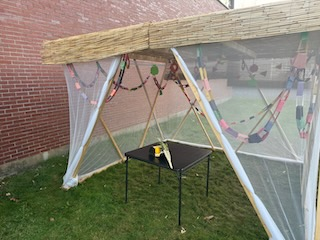
אַחַת שָׁאַלְתִּי מֵאֵת־ה׳ אוֹתָהּ אֲבַקֵּשׁ
שִׁבְתִּי בְּבֵית־ה׳ כָּל־יְמֵי חַיַּי
לַחֲזוֹת בְּנֹעַם־ה׳ וּלְבַקֵּר בְּהֵיכָלוֹ׃One thing I ask of God, one thing I seek –
To dwell in God’s house all the days of my life,
To gaze upon God’s pleasantness, and visit God’s palace.— Psalm 27:4
Dear family of friends,
We’ve been singing this verse, Achat sha’alti, since the beginning of Elul, a full month before Rosh Hashanah, and it will remain with us through Simchat Torah at the end of Sukkot. The tune alone might give us a sense of its meaning and relevance to this season: our yearning to live in bliss, connected to what really matters in our lives. But if we look at the words closely, a puzzle emerges: why would I yearn to visit God’s “palace,” if I’m already dwelling in God’s “house”?
My colleague Rabbi Ora Weiss sees these as one request, on two levels. The request to “dwell in God’s house all the days of my life” expresses a wish to experience connection in our regular life of the world – in this house that God made for us. We might experience it in a poignant moment with a loved one, or when we notice the beauty of a New England autumn day. Imagine if you experienced your day-to-day life like that: to see the beauty in every thing, and feel connected to the world in every moment!
But then what is God’s palace that we should want to visit it?
The nineteenth century Polish rabbi Yehudah Aryeh Leib Alter of Ger (known as the “Sfas Emes,” after the title of his book, meaning “the Language of Truth”) said that to “dwell in the house of God” is what we seek to do during the week, while to “visit God’s palace” is something we can achieve on Shabbat. By extension, we could make the same distinction between most of the year and the High Holidays. When we come to synagogue on Rosh Hashanah and Yom Kippur, we reach for something more sublime than we can access during the rest of our lives. Surrounded by our community, inspired by music and liturgy and the altered state of the Yom Kippur fast, we can glimpse a way of being that transcends our everyday lives.
And then, during Sukkot, we sit in God’s house: a temporary dwelling with a roof of leaves, open to the rain and the stars. A sukkah may be a bit anticlimactic compared to the fervor of Ne’ilah at the end of Yom Kippur, but in being just a bit out of our ordinary lives, it offers an echo, which we hope will continue to resonate throughout the year.
Maybe this is what it means to be written in the book of life. And so may you be inscribed and sealed: to get to visit God’s palace these High Holidays, and sit in God’s house all the days of your life.
~ Reb Josh
